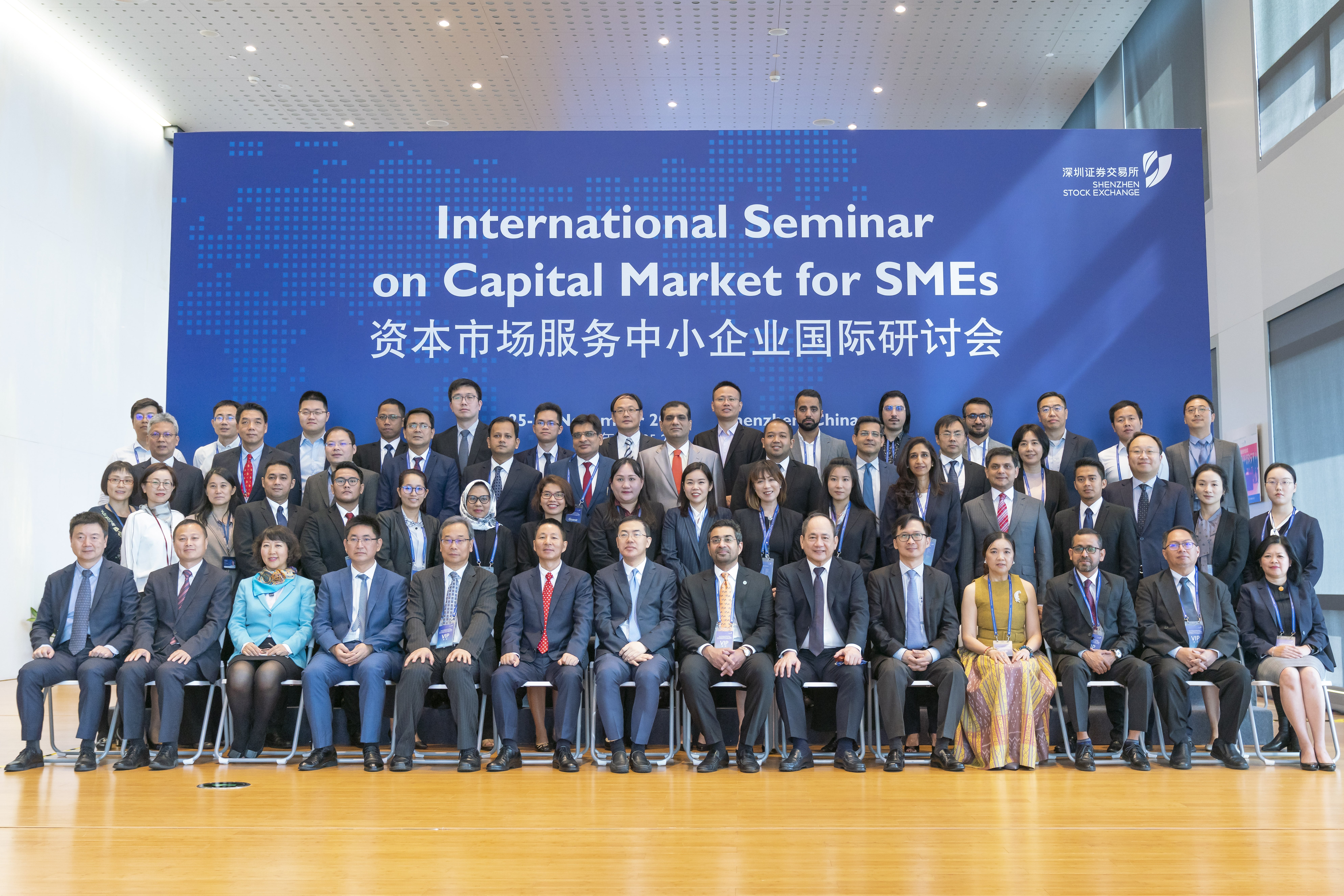Building an ecosystem for SME financing
Shenzhen Stock Exchange holds International Seminar on Capital Market for SMEs
An international seminar on capital markets for SMEs was held on 25 & 26 November 2019 at the headquarters of Shenzhen Stock Exchange (SZSE). Representatives of exchanges and regulatory bodies from Bangladesh, Cambodia, Indonesia, Malaysia, Pakistan, the Philippines, Thailand, and UAE participated in the event.
The seminar focused on building an ecosystem for SME financing through the capital markets. It covered topics including corporate governance and information disclosure, fostering innovative issuers, market development and investor services, and capital market infrastructure development. Recognising the importance of SMEs in supporting economic growth and job creation, representatives highlighted interesting approaches in developing capital markets for SMEs.
First, market segmentation has become a common approach to serve SME issuers. Indonesia Stock Exchange has recently issued regulations on listing shares and equity-like securities on its acceleration board, offering less stringent entry standards for SMEs. Dhaka Stock Exchange and Pakistan Stock Exchange both launched SME boards recently. Other exchanges’ junior boards generally adopt more flexible listing rules and information disclosure requirements for SMEs.
Second, pre-IPO services have become the new trend. Shenzhen Stock Exchange created a pre-IPO capital matching platform known as the V-Next platform in 2015. This platform now serves over 16,000 professional institutional investors, and 10,000 companies with footprints in 40 countries and regions in the world. It has helped companies raise 35 billion RMB (5 billion USD). The Stock Exchange of Thailand (SET) also offers comprehensive SME development initiatives to educate, foster and support SMEs in preparing for IPO. The Cambodia Securities Exchange has been operating nationwide promotion programmes to educate and prepare potential private-sector SMEs for listing.
Third, social responsibility and sustainable development is emphasised in SME markets. The Philippine Stock Exchange (PSE) has issued Sustainability Reporting Guidelines for public listed companies, one of the first such guidelines issued in the region, and the exchange also offers Bell Awards for top performers across Environmental, Social & Governance (ESG) factors. SET has recently initiated a Social Impact programme, promoting green practices, sustainable consumption, business partnership, skills development, knowledge sharing, awareness and visibility.
Fourth, digital technology has been adopted for diverse exchange functions. SET has developed sophisticated online investor educational programmes delivered through various social media channels. SZSE offers EasyIR to enable interaction between investors and listed companies. SZSE also adopts a data-driven smart surveillance system to consolidate information from multiple sources for market surveillance. SZSE is also developing blockchain technology for potential application in use cases of capital matching and asset-backed securities. Pakistan Stock Exchange has announced an upgrade plan for its trading and surveillance systems with support from SZSE.
Fifth, collaboration among market participants is needed to build a financial ecosystem for SMEs. The Securities Exchange Commission of Thailand (SEC) emphasised inter-agency collaboration for SME financing. The regulator must create the environment for dialogue and brainstorming of the public and private sectors. SEC of Thailand launched SME funds to offset risk borne by potential SME issuers. Shenzhen Capital Group, China’s leading venture capital firm, highlighted the role of venture capital in integrating initial resources for SMEs prior to IPO. China International Capital Corporation, China’s flagship investment bank, emphasised the role of financial intermediaries in helping SMEs on their way to IPO. SZSE cited its experience in integrating different market participants and local governments to form an ecosystem of support for SMEs.
Mr. Wang Jianjun, President & CEO of SZSE, put particular emphasis on entrepreneurship and innovation as new the engine to power economic transition and sustainable development in the future. SZSE proposes regional collaboration to facilitate cross-border financing for SMEs through various channels of capital matching. Mr. Wang also called for deepened cooperation on a technological level to promote the digital transformation of regional capital markets. He advocated regional connectivity for a more inclusive and open ecosystem for SME financing.
